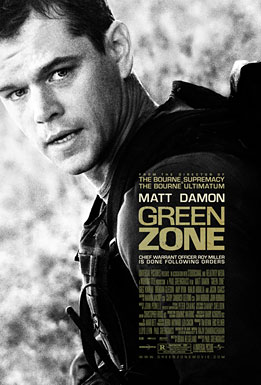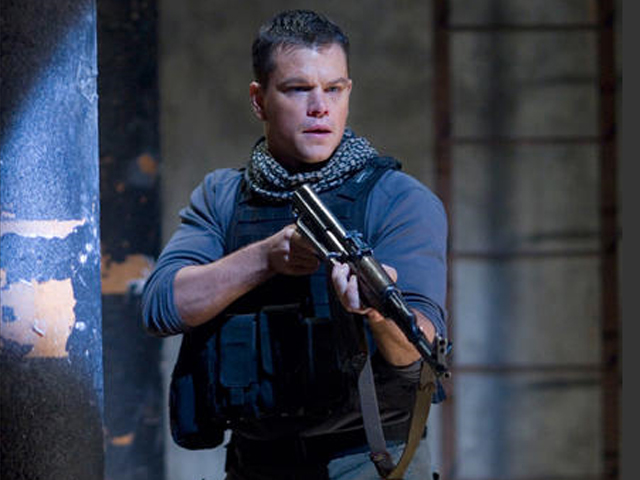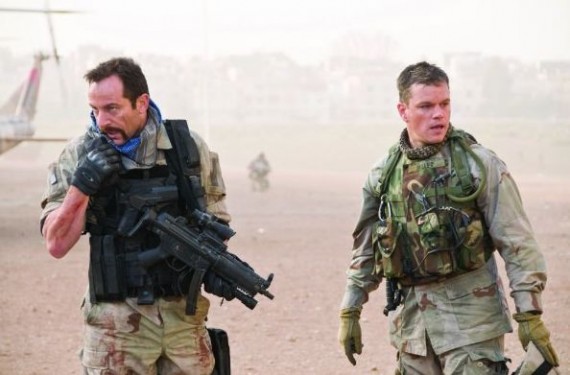Sat 13 Mar 2010
It Ain’t Easy Being Green
Posted by Ethan under Film Review, NYC Film Critic
[5] Comments
Green Zone
Directed by Paul Greengrass
Starring Matt Damon, Greg Kinnear, Brendan Gleeson and Amy Ryan
***
Arriving in theaters the week after The Hurt Locker dominated the Oscars, picking up six trophies including Best Director and Best Picture, Paul Greengrass’ Iraq War-themed action drama Green Zone is in something of a tight spot.
On the one hand, the interest generated by The Hurt Locker‘s win may encourage more moviegoers to give Greengrass’ film a chance, thus bucking the trend of Iraq-related movies failing at the box office.* At the same time though, Green Zone will almost certainly be pitted against Kathryn Bigelow’s lovingly reviewed film, with many critics and viewers concluding that it comes up short. That’s not entirely fair though, because while the two films do share certain similarities–most notably a relentless pace and you-are-there camerawork–their treatment of this controversial conflict is very different. In fact, one could make the case that The Hurt Locker, which studiously avoids making any specific statements about America’s presence in the Middle East, is closer to a mainstream studio picture, while the politically pointed Green Zone more closely resembles a fictionalized version of a independently financed left-wing documentary like No End in Sight or Uncovered: The War on Iraq.
Set in early 2003, shortly after the fall of Baghdad but before the capture of Saddam Hussein, Green Zone tracks a roughly three-day span in the life of Chief Warrant Officer Roy Miller (Matt Damon), an American soldier tasked with finding the country’s stockpile of WMDs that served as the impetus for the war. But when every WMD site that Miller visits turns out to be clean, he starts to suspect that the Army’s on-the-ground intelligence is faulty, an opinion that doesn’t make him popular with his military higher-ups or the sleazy Donald Rumsfeld-like government official (played by Greg Kinnear) that just flew into town for a visit. While in the field on his latest mission, Miller is approached by a civilian who informs him of a secret meeting with high-ranking Iraqi army officers happening somewhere nearby. It turns out that one of the men in attendance is none other than General Al Rawi, a key figure in Hussein’s government who is somehow connected to the WMD intel that Miller has found so unreliable. With the help of a similarly disillusioned CIA operative (Brendan Gleeson), this patriotic G.I. Joe soon learns that the case for the war in Iraq wasn’t the slam-dunk his government made it out to be.
In both its content and execution, Green Zone is a more ambitious film than The Hurt Locker, which primarily concerned itself with replicating the day-to-day life of a soldier on the ground. This also means, of course, that Greengrass and screenwriter Brian Helgeland have given themselves more room for error and their film does stumble more often and in more noticeable ways than Bigelow’s focused, controlled effort. In their attempt to frame the film’s arguments about the war in the context of a narrative feature, the filmmakers occasionally overreach, resulting in lines of dialogue that are far too on-the-nose or plot threads that make strong political points but serve little dramatic purpose. The most notable of these is a subplot involving a Wall Street Journal reporter (played by Amy Ryan) who wrote a number of stories about Iraq’s WMD program based on unreliable information fed to her by Kinnear. Clearly this character has been inserted into the movie to remind the audience about the Judith Miller case, but she’s so removed from the brunt of the movie’s narrative, her scenes feel like a distraction.
All that said, there’s something thrilling about watching a studio picture that actually expresses a strong political point of view. This may simply be a sign of how toothless most Hollywood movies are these days, but I can’t help but admire Greengrass for making a war movie that systematically punctures the myths that helped cause the war its depicting. (Granted, most of these myths have already been exposed elsewhere, but the truths bear repeating.) Green Zone also demonstrates the director’s continued mastery of the propulsive verite kind of action filmmaking he developed and honed in his two Bourne adventures. As Miller charges through the Baghdad streets, the camera is always just steps behind him moving at the same breathless pace. Green Zone‘s Oscar chances are nil, but the fact that Greengrass convinced Universal to fund this bold, if flawed film is a victory in and of itself.        Â
Green Zone opened in theaters on Friday.
*Based on the movie’s weak opening day numbers (a measly $5 million) the public’s indifference to Iraq War movies sadly continues.




“It is” = “it’s”, not “its”
strong politics, maybe. good politics? ha, thats a joke. i think america has spoken as far as their feelings about modern day liberal politics movies and war movies, by simply not buying tickets. even with all the liberal columnists seeping their praise into the reviews, it’s not enough to rescue any of them. funny thing is, the only people who like the movies, or supposedly, are liberal critics. but lets be honest, you all dont really like them….if it was the same exact thing with conservative politics, there would be at least a full star difference. but its ok, cause people realize that now and thats why newspapers are headed down the tubes.
lets think here…. even mega stars cant do anything to attract audiences to an un-entertaining, un-enganging, not relevent, somewhat twisted and anti-american spin depicted on screen. and you all blatently say “this war is wrong. blah blah blah” and essentially rip it to shreds then say “but we support the troops” because its the politically correct thing to do. but lets be serious. if you supported the troops, you’d keep your mouth shut. no matter whether you follow your sick twisted opinions with “support the troops or not” you destroy their morale and not one soldier buys that crap. its an insult to them.
there is a difference between the movies coming out now and movies like full metal jacket….
lets think about the flops
Josh Brolin and W… no awards, no money
valley of elah, tommy lee jones….mild acclaim, 6 million
rendition, gylennhall, 9 million, trashed reviews
the kingdom, jennifer gardner jamie fox, 40 million, bad reviews
lions for lambs, cruise streep redford….no acclaim, 14 million
redacted, .6 million lol
stop loss, crap, 9 million
rendition
but then of course the first iraq movie to be neutral or conservative, and patriotic….”the hurt locker” sweeps the academy awards…. hmmm. and while it didnt make a killing in the box office it still beat most of these liberal movies and will do well on video now that its won. not mention it was an independent movie that cost chump change. america has spoken.
black hawk down, not iraq, but modern day politics none the less, 100 million, critical acclaim. nuff said
in fact now that i think about it, iraq aside, really, all conservative war movies trump the liberal ones. even we were soldiers made 80 million. tears of the sun 50 million, letters from iwo jimma and flags of our father both received critical acclaim and letters was nominated for best picture and director, the patriot over 100 million. saving private ryan, no explanation needed
in fact, full metal jacket and born on the fourth of july may be the only two succesful liberal war movies ever made and it seems america has wised up since then.
some americans are so ignorent they call themselves liberal and vote liberal and dont even know what it is. but when it comes down to their money to hear the message, they just dont buy the bullcrap and give it a thumbs down. but keeep supporting crappy liberal lying movies.
people wanna argue that its not true the liberal iraq movies are unsuccesful, but its not just those, its most liberal movies! conservative themed movies consistently do better!!!1 avatar doesnt count. i saw that and enjoyed it. its just a damn good movie with liberal undertones. it didnt set out ultimately for a liberal agenda?
so strong politics? more like WEAK according to the numbers.
get it right. just shoot straight, man.
Agree. Entertaining and a tribute ironically to our democracy that it can be made and watched, however few people were in the theatre with me today. Hoo Hah.
Oh yea, just what we need, another far left hate America pile of crap. I bet5 you get all sweaty thinking about he evil Americans killing int eh dead of night…Don’t ya leftie?
When will Hollyweird realize that 95% of America is sick of this trash.
What a load of BS. Something “thrilling” about Hollyweird putting a leftist slant on a movie. What a moron. This movie tanked on the release and will be yet another bomb that loses money. I for one find it highly amusing! Maybe when Hollyweird makes a realistic war movie and not some Anti-American sewer scum propaganda, people might go see it. Stay in your Obamacare fantasy world dipstick.